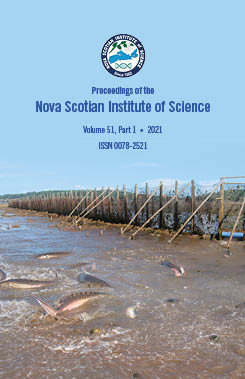Seafloor and sediment characteristics of pulp mill waste discharges in the 20th century: Framework data for Boat Harbour, Nova Scotia, remediation projects and for baseline surveys of new pulp waste outfall installations in Northumberland Strait
DOI:
https://doi.org/10.15273/pnsis.v51i1.10736Abstract
During the 20th century, contamination of marine environments by Canadian pulp and paper mill effluent (PPE) resulted in the imposition of federal government regulations in 1971 that were revised and strengthened in 1992. This report reviews seafloor sediment features for three marine settings (intertidal, subtidal and prodelta) arising from 20th century PPE discharges from four pulp and paper mills, one located near New Richmond, Quebec, and three situated along the lower reaches of the Saguenay River, Quebec. The four mills began operations between 1965 and the early 1900‘s. Observations of their proximal and distal sediment and Foraminifera characteristics in relation to PPE discharge outfalls offer guidance for the remediation of potentially toxic, multi-decadal waste accumulations in several lagoons of Boat Harbour, Nova Scotia. Seafloor environmental data discussed for a fifth mill‘s subtidal outfall, located on the eastern shore of Canso Strait, may be particularly germane for selecting the site and baseline environmental survey criteria for a new PPE submarine outfall that has been proposed (presently rejected) by Northern Pulp Company for the Caribou Harbour area of the Northumberland Strait coast, in the event that the currently closed mill is permitted to be reactivated in the future.
Keywords: effluent, environmental effects, organic matter, pulp mill waste, sediments


